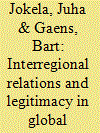|
|
|
Sort Order |
|
|
|
Items / Page
|
|
|
|
|
|
|
| Srl | Item |
| 1 |
ID:
112864


|
|
|
|
|
| Publication |
2012.
|
| Summary/Abstract |
The global financial crisis and the shift of economic strength to a rising Asia have ushered in European introspection and allusions to the decline of the European Union (EU). The EU's ambitions to have a normative impact in the world have been called into question. The seven articles in this guest-edited issue explore processes of change relating to geopolitical definitions, regional actorness, interregionalism, and normative power within the framework of EU-Asia relations. This introduction contextualises the themes taken up in the different articles. It considers important divides in the recent history of Europe-Asia relations and outlines key transformations in the global environment, before critically reflecting on the significance of normative power for Europe.
|
|
|
|
|
|
|
|
|
|
|
|
|
|
|
|
| 2 |
ID:
112868


|
|
|
|
|
| Publication |
2012.
|
| Summary/Abstract |
This article explores the ramifications of the European Union's (EU) internal legitimacy debate for its external relations. It applies the Asia-Europe Meeting (ASEM) as a case study to examine the EU's attempts to promote legitimacy in global governance, more specifically in interregional institutions. The article's theoretical framework draws from the EU's legitimacy debate. It identifies three key sources of legitimacy, namely, (i) input legitimacy or democratic control and accountability, (ii) output legitimacy or performance and achievement of core purposes, and (iii) the degree of common identity as externalised through collective representation and the articulation of shared norms and values. The empirical analysis thereafter leads to three observations. First, the EU's presence has contributed to an increased democratic involvement by ASEM's different stakeholders including parliaments and civil society. Second, purely from an institutional legitimacy perspective ASEM achieves its purpose as a forum to 'constructively engage' with Asian countries and address issues relating to global governance. Third, ASEM reveals the EU's dual identity as an intergovernmental grouping and an organisation with a gradually increasing capacity of collective representation. However, the advancement of the EU's normative objectives through ASEM has been problematic, leading to a more interest-based and pragmatic policy path. The article concludes that the EU's legitimacy debate has had a bearing on relations with Asia and, in particular, with ASEM. Importantly, and given the EU's setbacks, some elements of the 'EU's way' have proven successful in promoting democratic notions of legitimacy beyond the state.
|
|
|
|
|
|
|
|
|
|
|
|
|
|
|
|
| 3 |
ID:
093651


|
|
|
|
|
| Publication |
Surrey, Ashgate Publishing Company, 2009.
|
| Description |
xiv, 260p.
|
| Standard Number |
9780754677901
|
|
|
|
|
|
|
|
|
|
|
|
Copies: C:1/I:0,R:0,Q:0
Circulation
| Accession# | Call# | Current Location | Status | Policy | Location |
| 054737 | 327.405/GAE 054737 | Main | On Shelf | General | |
|
|
|
|
|
|
|
|
|